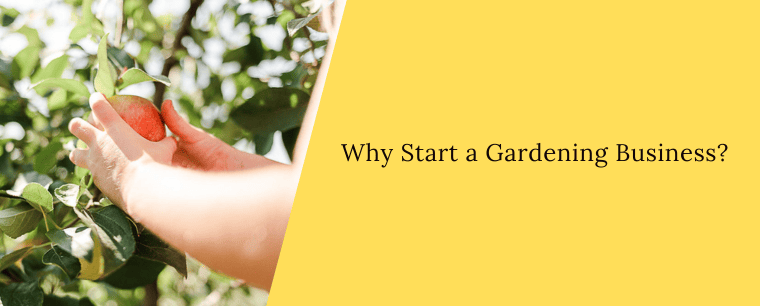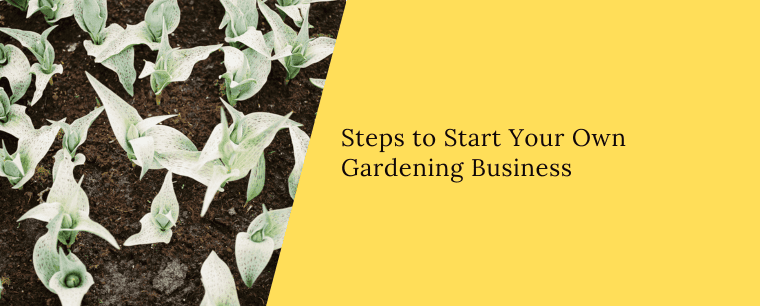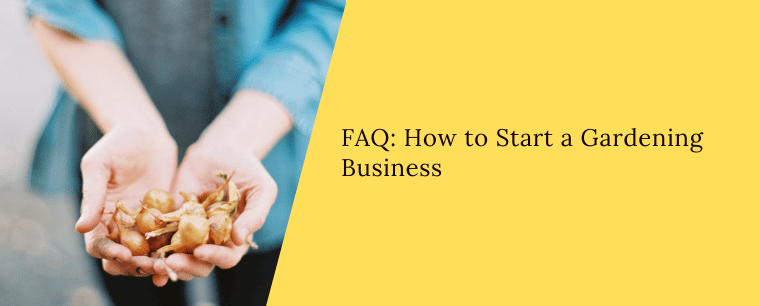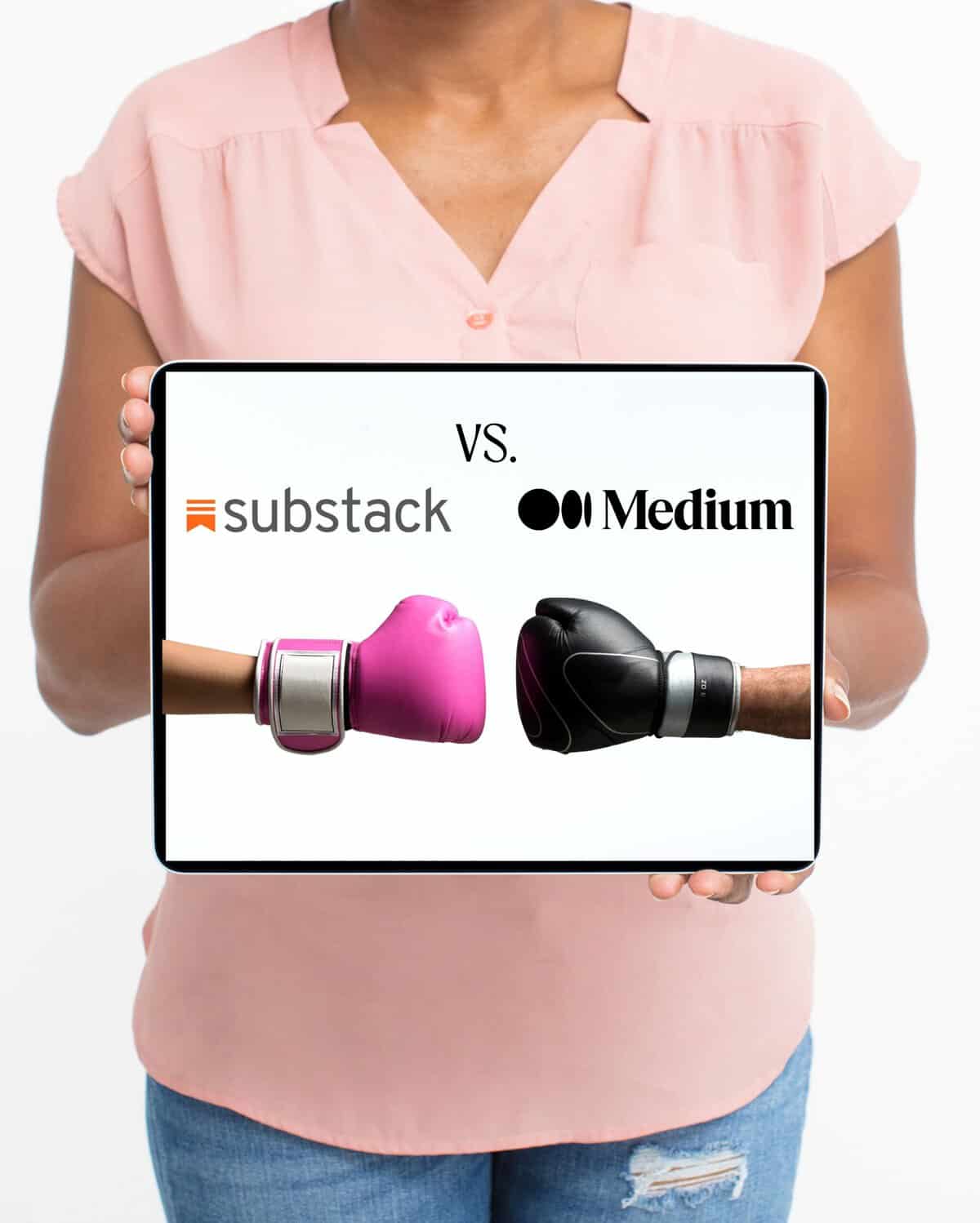This page may contain affiliate links. Please read my disclosure for more information.
Are you an avid gardener looking to share your knowledge with the world? If you’re wondering how to start a gardening business and make money, keep reading. I’ll review the steps to starting your gardening business. I’ll also interview Kareen Erbe from Broken Ground. She’s a garden design consultant and educator based in Bozeman, Montana. Kareen helps people in cold climates grow their own food so they can live healthier, more sustainable lives. She’s transformed her dream of self-reliance into a thriving business venture and is an influential figure in the gardening community.
What is a gardening business?

There are many different types of gardening businesses, each with its own focus and target market. A gardening business offers specialized services related to the care, maintenance, and enhancement of gardens. As a business owner, you can cater to a diverse clientele, including homeowners, businesses, non-profit organizations, and public agencies. Tasks will range from lawn care, planting, permaculture, pest control, basic landscaping, garden design, and more.
In addition to traditional hands-on gardening tasks, many modern gardening businesses have expanded their scope, working with digital platforms to offer training courses, consultations, workshops, and multimedia content. Essentially, a gardening business combines expertise in horticulture with the overarching goal of beautifying and optimizing outdoor green space to align with a client’s visions.
Gardening Business Ideas
No matter your gardening interests, there is likely a gardening business idea that’s a good fit for you. If you are considering starting your own gardening business, it is essential to research the market and identify a niche that you are passionate about. Here are several business ideas for you:

1. Garden maintenance
These businesses provide regular garden care services, such as mowing, weeding, pruning plants and trees, and fertilizing.
2. Landscaping
Landscaping businesses design and install new gardens and renovate existing ones. They may also offer different services such as hardscaping (patios, walkways, etc.), irrigation, and lighting.
3. Nurseries
Nurseries grow and sell plants, trees, and shrubs to the public and other businesses, such as landscape contractors.
4. Garden centers
Garden centers sell various gardening supplies, including plants, seeds, tools, and fertilizers. They may also offer services such as garden design and plant selection assistance.
5. Florists
Florists sell flowers and other cut floral arrangements. They may also offer services such as wedding and event floristry.
6. Arborists
Arborists are tree care specialists who provide pruning, planting, and disease and pest control services.
7. Garden consultants
Garden consultants provide advice on all aspects of gardening, from design and planting to pest control and fertilization.
8. Hydroponics businesses
Hydroponics businesses design and install hydroponic systems used to grow plants without soil.
9. Vertical farming businesses
Vertical farming businesses grow plants in vertically stacked layers, which allows them to produce more food in a smaller space.
10. Gardening blog business
A gardening blog business is an excellent way to share your knowledge and passion for gardening with others. You can monetize your blog through advertising, affiliate marketing, or selling your own products and services.
11. Gardening YouTube channel business
A gardening YouTube channel business is another excellent way to share your gardening expertise with others. You can monetize your channel through advertising, sponsorships, or selling your own products and services.
12. Gardening course creator/educator
As a gardening course creator or educator, you can create and sell online courses or workshops on various gardening topics on your own website or platforms like Skillshare and Udemy. This is a great way to share your knowledge and expertise with others and generate income at the same time.
13. Gardening author
A gardening author can publish books on various gardening topics, such as how to grow specific types of plants, garden design, or pest control. Gardening books can be published in print through a publisher, an ebook on your website, self-publishing on Amazon KDP, and audiobook formats on Audible.
In addition to these general categories, there are also many specialized gardening businesses, such as those that focus on growing organic produce, native plants, or edible flowers. There are also businesses that specialize in certain types of gardening services, such as pruning fruit trees or installing irrigation systems.
Why start a gardening business?

There are many reasons to start a gardening business. Some of the most common reasons include:
1. Passion for gardening
If you love gardening, starting a business in this field can be a great way to turn your passion into a career.
2. Flexibility
Gardening businesses can be very flexible, allowing you to set your own hours and choose your own clients.
3. Profit potential
Gardening businesses can be profitable, especially if you specialize in high-demand services or target a niche market.
4. Job satisfaction
Gardening can be a very rewarding career, both physically and emotionally. You’ll get to work outdoors and help people create and maintain beautiful gardens.
Steps to Start Your Own Gardening Business:

There are several important steps to starting a gardening business:
1. Gardening Business Niche
The first step in starting any business is to choose a business idea and niche you are passionate about and have some basic knowledge and experience with. The gardening business idea should be a blend of your personal strengths and passions and market needs. It’s about finding a balance between what you love to do, what you’re good at, and what the market needs.
2. Market Research
Market research is essential for any new business, but especially important for a gardening business. You need to understand your target audience and market demand to create a successful business plan.
Here are some things to consider when conducting market research for your gardening business:
- Who is your target audience? Are you targeting homeowners, businesses, or both?
- What services do your target customers need and want?
- What are the current trends in the gardening industry?
- What are the strengths and weaknesses of your competitors?
You can conduct market research by talking to potential customers, surveying them, and analyzing industry data.
3. Write a Business Plan
Once you have conducted your market research, you need to draft a business plan. A business plan is a roadmap for your business, and it should include the following information:
- Your business goals and objectives
- Your target market
- The services you will offer
- Your marketing and sales strategy
- Your financial projections
A well-written business plan is essential for any new business, but it is essential for a gardening business. This is because gardening businesses are often seasonal, and it is essential to make sure you have a plan for generating revenue during the off-season.
4. Marketing Your Gardening Services
- Create a website and blog:
- Create an easy-to-use website with Showit.co and build your blog on WordPress.org.
- Social Media:
- Set up social media accounts and pages on different social media platforms to attract new clients.
- Share your garden projects and engage with potential customers.
- Traditional Marketing:
- Advertise in local newspapers or on the Nextdoor app.
- Build a client base with current clients and word of mouth.
- Network:
- Collaborate with other gardeners.
- Join gardening or small business groups.
- Advertise:
- Run targeted ads to drive traffic to your website.
5. Maintaining and Growing Your Gardening Business
Maintaining a thriving gardening business requires more than just expertise in horticulture.
Happy customers are the bedrock of consistent growth for most businesses, acting as organic brand ambassadors through word-of-mouth recommendations. It’s important to be willing to adapt your businesses and services based on customer feedback. Stay current with gardening trends and technology to remain competitive.
Managing your business expenses will help keep the business running smoothly and allow for growth and reinvestment.
Now, let’s deep dive into Kareen’s interview and learn about her inspirational story of how she started her gardening business.
Interview with Kareen Erbe, Broken Ground

Introduce yourself – tell us about your business and customers.
Hi, I’m Kareen Erbe. I’m a garden design consultant and educator. For over a decade, I’ve helped people in cold climates grow their own food so they can eat healthier, live more sustainably, and become more self-reliant. Through consultations, design services, my signature Resilient Homestead Program, and my YouTube channel, I’ve helped thousands of people grow nutritious food for their families.
From getting clients started on their first-ever garden to troubleshooting their garden pest issues, to working with couples on designing a full-blown self-reliant homestead, to designing 30-acre permaculture farms, I work with people who want to build their self-reliance on a small or large scale.
At the same time, I’m building my family’s self-reliance on our ¾ acre suburban homestead in Bozeman, Montana. With a greenhouse, large annual gardens, a food forest of fruit trees and berry bushes, and a flock of chickens, we manage to grow a good portion of our own food, even with our short and unpredictable growing season.
What inspired you to start your own business?
From a young age, I loved wild animals and was deeply concerned about environmental issues. I raged at the greed and shortsightedness of those who didn’t see the beauty and importance of our natural world.
In my early twenties, that outrage and idealism got me involved in social justice issues. I traveled to Latin America, spent a year as a human rights observer in Guatemala, and came back from that experience wanting to ‘change the world.’ I had seen how our consumer way of life was dramatically affecting not only our planet but people in the developing world. So, rather than dwelling on the problems, I began looking for solutions. I enrolled in a course offered by Dr. Vandana Shiva at her organic farm in India. It was during that course that I first heard the term permaculture, a whole-systems approach to land management and sustainable living. I was immediately hooked by this concept and the solutions it had to offer.
In permaculture, there is a saying, “All the world’s problems can be solved in a garden.” Indeed, I have found over my years of gardening that this simple statement just might be true. On a personal level, the ability to grow food and create something with our own hands is a powerful act. The opportunity to get outside every day and connect with our natural world is a calming force.
Climate change, a pandemic, food shortages, topsoil loss, wildfires – these are unsettling and challenging times, even more so than when I was young. More and more, we need to get back to the basics. And that’s essentially why I started my business. I believe learning how to grow our own food and reconnecting with the natural world are some of the most positive steps forward at this time. My business has made me feel like I am contributing positively to my community while setting up food security for myself and my family.
Through my business, I empower other individuals and families to do the same. Rather than feeling helpless and fearful about the future, my clients can feel like they are living part of the solution while providing their families with healthy, nutritious food.
What are the most important lessons you’ve learned as an entrepreneur?
“Start before you’re ready.” That’s probably the most important lesson that I’ve learned. Whether it was starting my business or embarking on new business ideas, I’ve often delayed the process, thinking that I’m not good enough or don’t know enough or don’t have ‘x’ or ‘y’ in place. I realize now that those were just stalling tactics that had everything to do with a lack of confidence and the discomfort of putting myself out there.
“Get out of your comfort zone and test your edges.” As we like to say in permaculture, “The edge is where the action is.” It’s the zone of most productivity in ecosystems. The same applies to business. Getting out of your comfort zone, whether it’s public speaking, writing, making videos, or sharing your ideas with an audience, will help you and your business grow.
“Reinvest in your business.” Once you’re better established, spending money on your branding, your website, additional professional development courses, or masterminds is essential to meet you at every stage of your business growth.
What resources have been helpful in your personal and professional development?
Marie Forleo’s B-School was super helpful in terms of giving me a crash course on business since I had come from a non-profit background.
I also sought out opportunities with my local Women’s Business Center and other small business support within my community.
I’ve found Kelly Diels’ work and Sage Lavine’s Women Rocking Business helpful as well.
Books:
- Braiding Sweetgrass by Robin Wall Kimmerer,
- Emergent Strategy by adrienne maree brown,
- What to Do When It’s Your Turn by Seth Godin,
- Healing Grounds by Liz Carlisle.
Podcasts:
- On Being with Krista Tippett,
- The Good Life Project with Jonathan Fields.
What platform, software, or tools do you use to run your business?
- Mailchimp,
- YouTube,
- Stripe,
- Zoom.
How do you maintain a work-life balance as an entrepreneur?
This is a hard one for me! Especially because my business is so much a part of my lifestyle. I try to structure my time for days when I am focused on client work, days when I’m in the garden, and days off. But I’ll admit that it isn’t easy!
I also put regular fitness classes on my schedule every week, along with regular weekly hikes with girlfriends. That outside accountability is good for me to keep those commitments.
What advice would you give aspiring entrepreneurs who are just starting their journey?
Start before you’re ready. Understand that it’s going to take some stamina, grit, and resilience to be an entrepreneur. It’s definitely not the easiest career path, but it’s probably one of the most rewarding. Get support!
Entrepreneurship can be lonely. Most people around you won’t understand what it takes to constantly put yourself out there and self-generate ideas and motivation. That’s why it’s important to join a mastermind or get some sort of support early on to keep you motivated and accountable. Look for local resources and entities in your area that support small businesses. Take courses, attend networking events, and be intentional about being around others who are also small business owners.
Start small. I started my business with a $50 investment in a dry erase board and some markers. I had a part-time job to meet my base expenses, so I didn’t feel the financial pressure and stress of having to make a bunch of money right out of the gate. This allowed me to grow organically, to test out ideas, and to build a solid foundation for my business. After three years, I had the confidence, visibility, and credibility in my community to dedicate myself full-time to my business.
Be patient. Unlike the claims that you often see in the online space (e.g., ‘I made six figures in six months!’), most good and lasting businesses are built through consistency, commitment, and the desire to be of service in the world. They take TIME. Be patient with yourself and the process. Remember to give yourself some grace!
Where can people find you?
Website: https://brokengroundpermaculture.com/
Instagram: https://www.instagram.com/brokengroundmt/
YouTube: https://www.youtube.com/@BrokenGround
Wrapping up

Kareen’s journey in starting a gardening business is truly an inspiration for us all. As we discover insights from her experiences, it’s evident that the world of gardening, particularly life as a food grower, permaculture educator, garden designer, and soil builder, is filled with endless possibilities.
FAQ: How to start a gardening business

Q1: Is a gardening business profitable?
Absolutely, a gardening business has the potential to be highly profitable, especially in regions with a pronounced interest in landscaping, organic produce, and sustainable living. The initial investment is typically modest, mainly involving tools, seeds, and perhaps some training. Over time, as your client base expands and your reputation grows, you can garner higher rates for specialized services. The rise of urban farming, organic gardening, and personalized landscaping have opened up new avenues of revenue. Additionally, diversifying into digital platforms, such as offering online courses, consultations, or tutorials, can create additional income streams.
Q2: What qualifications or training are needed to start a gardening business?
To launch a successful gardening business, having a combination of practical gardening experience, training, and business savvy is beneficial. Here’s a breakdown:
- Practical Experience: Hands-on experience is invaluable. This can be gained by working in a nursery, a landscaping firm, or simply managing a home garden. This will help you understand the intricacies of plant care, soil management, and seasonal challenges.
- Training: While not always mandatory, having formal training or certification in horticulture, botany, or landscape design can significantly boost your credibility in the market. There are many institutions and community colleges offering courses in these areas.
- Business Skills: Like any business, understanding the basics of finance, marketing, customer service, and operations is crucial. Many local business development centers offer courses in entrepreneurship, which can be beneficial.
Q3: Do I need specific permits or licenses to operate a gardening business?
Depending on your location and the exact nature of your gardening business, there might be permits or licenses you need to obtain. Here are some general considerations:
- Business License: Almost every locality will require you to have a basic business license to operate legally.
- Nursery License: If you plan to sell plants, many states require a nursery license or permit, especially if you sell on a larger scale or ship plants across state lines.
- Pesticide Application License: If you’re offering pest control as part of your gardening services, you might need a license to apply pesticides, herbicides, or other chemicals.
- Landscaping License: Some states or local jurisdictions require a specific license if you are doing advanced landscaping, especially if it involves modifying the existing terrain, installing irrigation systems, or handling large trees.
Q4: Is insurance necessary for a gardening business?
Yes, public and employer liability insurance is essential when starting a gardening business. Here’s why:
- Protection from Claims: Gardening work often involves operating on most clients’ properties and using heavy equipment. If, during your work, any damage occurs to the property or if a third party (like a visitor or neighbor) gets injured, public liability insurance can protect you from potential claims.
- Professional Image: Having insurance not only offers protection but also projects a professional image. It assures your clients that they’re dealing with a serious business that has taken necessary precautions.
- Peace of Mind: Accidents can happen, even with the most diligent precautions. With insurance, you can have peace of mind knowing you’re protected from unforeseen financial setbacks related to claims or legal actions.
- Contractual Requirement: In some cases, especially when working with corporate clients or on larger projects, public liability insurance might be mandatory.
For anyone starting a gardening business, it’s wise to consult with an insurance agent to understand the appropriate coverage level and ensure that liability insurance and public liability insurance are part of your business protection strategy.







+ show Comments
- Hide Comments
add a comment